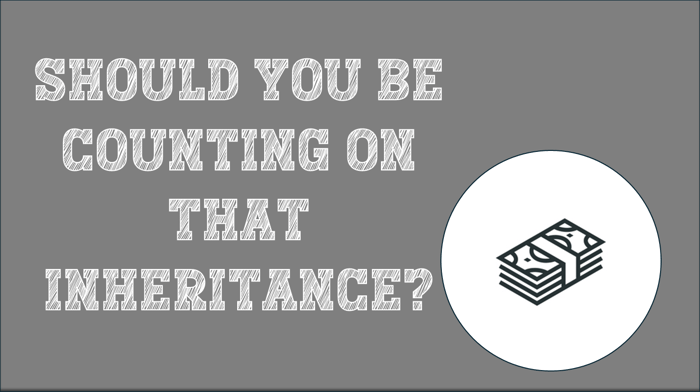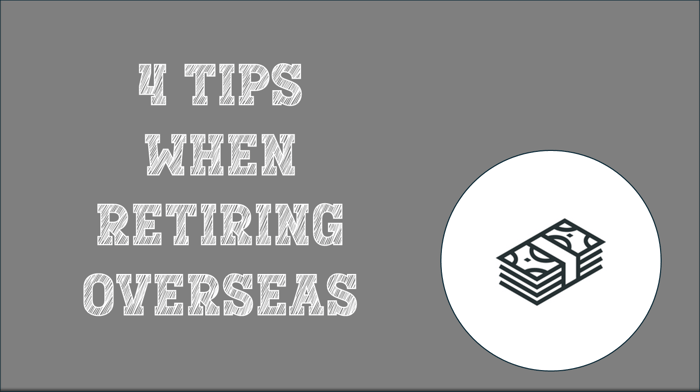THE INHERITANCE PLAN
Many Americans won’t receive an inheritance, but for those who expect to, the money they receive can be a significant addition to their savings. According to a recent survey by HSBC, the average American inheritor receives roughly $177,000. A similar study by Thomas Piketty (author of “Capital in the 21st Century”) found that the U.S. annual inheritance flow is equal to about 20% of the annual national income. The reason for such a large percentage stems from the fact that some people will receive large inheritances.
With that in mind, it’s not surprising that many people plan on the money they expect to receive from an inheritance. However, a surprisingly large number of Americans plan their retirements around what they expect to receive from their parents. In fact, the same HSBC study found that two-thirds of beneficiaries are partially reliant on said future wealth for their retirement, and 10% plan on using their inheritance to fully fund their retirement.

The Problem
The prospect of using your inheritance to fund (or partially fund) your retirement is an enticing one. After all, an inheritance is as close to “free money” as one can get. Most states don’t collect inheritance taxes, and very few estates are not large enough to have to pay Federal taxes. As a result, many future beneficiaries view their inheritance as a suitable “nest egg.” The problem with this sort of thinking is the same problem that comes with depending upon any source of unearned income: It isn’t reliable.
Even if you’ve already spoken with your parents about it, your inheritance isn’t set in stone. Your inheritance is dependent upon what your parents have left for you at the end of their life. It would be irresponsible to ignore the possibility that they might not have any money remaining to will to you after they die.
Little or no inheritance might seem unlikely today, but there are many life events that could occur that might reduce the size of your inheritance. For example, a recent study by Ameriprise Financial found that the average retiree loses $117,000 to unplanned occurrences. You must be prepared for the possibility that such a loss could reduce or wipe out your inheritance.
Getting Ahead of Your Inheritance

Planning what you’ll do with your inheritance is a smart idea, and I don’t mean to discourage you from doing so. However, it’s important to not rely on a source of income that you have no control over when it comes to paying for your retirement Needs expenses such as your housing and food costs. If you must include your inheritance as part of your retirement income, I would advise using the funds to meet your Wants & Wishes expenses. For more information on the Needs, Wants, & Wishes retirement framework, please click here.
3 Tips To Help You In Planning Your Inheritance:
- Check Your Parent’s State Tax Laws – I previously mentioned that most states don’t collect inheritance taxes. However, these six states are exceptions to that rule: Iowa, Kentucky, Maryland, Nebraska, New Jersey and Pennsylvania. It’s important to note that your inheritance tax (if any) will be based on your parents’ state tax rate. So, if your parents live in one of the six exception states, you should consult a tax advisor to determine the appropriate tax rate.
- Plan for Your Parent’s Estate – An estate can be the most valuable part of an inheritance. Conversely, it can also be a serious aggravation. When receiving an estate, you have three options. The first is moving into your parents’ home which is a fine option as long as your parents have fully paid off their house and it’s in good shape. The second option is selling the estate immediately. Federal inheritance laws grant you tax breaks when selling an inherited estate, so this can be an excellent source of additional income. The final option is holding onto the house and not doing anything with it. Unfortunately, choosing this option means incurring housing taxes and maintenance costs for little to no benefit. Therefore, this option is not recommended.
- Talk to your Relatives – The passing of a loved one can be an incredibly difficult time in your life. And dealing with decisions surrounding an inheritance in addition to the grieving process can be overwhelming. I recommend discussing your shared inheritance with any siblings you may have. This is especially important if you stand to receive an estate, as it may be split up between you and your family members.
Handling Your Inheritance
Now that we’ve covered how to plan and anticipate what you’ll receive for an inheritance, next we’ll review how you can use your inheritance to boost your retirement savings. Let’s say you expect to receive $1,000,000 in total from your inheritance. When making a financial plan based on that amount, it’s important to account for unexpected financial losses. As a result, you should take a conservative approach with your assumption and plan on only receiving $500,000.
A big part of retirement planning is partitioning. Therefore, your ideal plan will see you investing that $500,000 into a mix of stocks and bonds and paying yourself a steady stream of income according to the 4% Safe Withdrawal Rate. The 4% Withdrawal Rate is the rate at which retirees can “safely” withdraw each year and not run out of money in retirement. For more on the 4% safe withdrawal rate, please click on the link to my article titled; Will You Outlive Your Retirement Savings?
If you use the 4% Safe Withdrawal Rate based on the $500,000 in inheritance funds, you can expect to receive $20,000 annually for the rest of your life. This income strategy should help you maximize the benefit of your inheritance. Of course, there are many other ways to maximize your inheritance and provide you with a steady income stream in retirement. To learn more about maximizing your inheritance and boosting your retirement income, speak to a Certified Financial Planner.






